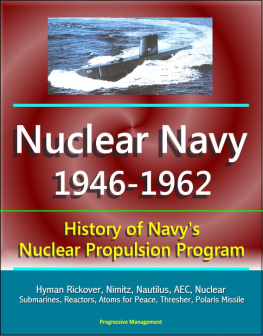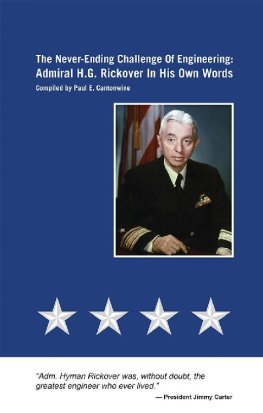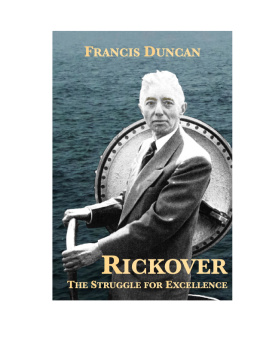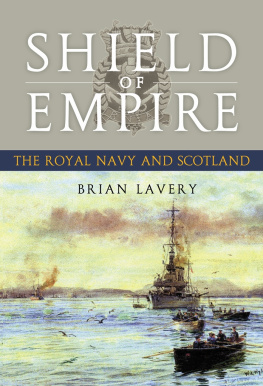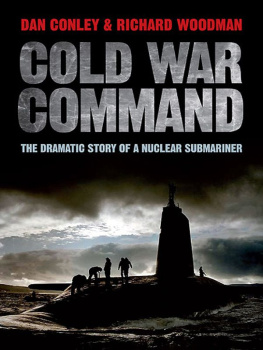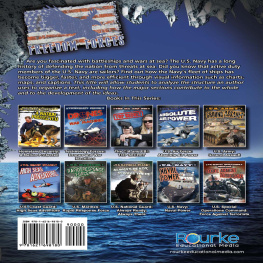RICKOVER
MILITARY PROFILES
SERIES EDITOR
Dennis E. Showalter, Ph.D.
Colorado College
Instructive summaries for general and expert
readers alike, volumes in the Military Profiles
series are essential treatments of significant and
popular military figures drawn from world
history, ancient times through the present.
RICKOVER
Father of the Nuclear Navy
Thomas B. Allen and Norman Polmar

Copyright 2007 by Norman Polmar and Thomas B. Allen
Published in the United States by Potomac Books, Inc. All
rights reserved. No part of this book may be reproduced in
any manner whatsoever without written permission from the
publisher, except in the case of brief quotations embodied in
critical articles and reviews.
Library of Congress CataloginginPublication Data
Allen, Thomas B.
Rickover : father of the nuclear Navy / Thomas B. Allen
and Norman Polmar.
p. cm. (Military profiles)
Includes bibliographical references and index.
1. Rickover, Hyman George. 2. United States. Navy
OfficersBiography. 3. AdmiralsUnited StatesBiography.
4. Nuclear submarinesUnited StatesHistory. 5. Nuclear
warshipsUnited StatesHistory. I. Polmar, Norman. II.
Title.
V63.R54A55 2007
359.0092dc22
[B]
2006023386
Hardcover ISBN13: 9781574884456
Softcover ISBN13: 9781574887044 (alk. paper)
Printed in the United States of America on acidfree paper
that meets the American National Standards Institute Z3948
Standard.
Potomac Books, Inc.
22841 Quicksilver Drive
Dulles, Virginia 20166
First Edition
10 9 8 7 6 5 4 3 2 1
To our friends who went down to the sea
in Admiral Rickovers submarines
Contents
Preface
Admiral Hyman George Rickover was a remarkable man. Almost singlehandly and against major opposition from within the Navyaccording to legendhe built a nuclear navy of submarines, cruisers, and giant aircraft carriers, all propelled by the atom.
Like most legends, there is some truth to the accounts of how Rickover built the Nuclear Navy. He did face opposition, and he did overcome it, often breaking the rules orthanks to his unique position of being double hatted within the Navy and the Atomic Energy Commission making up his own. In doing so, he certainly overcame the bureaucratic inertia, government regulations, and contracting policies that delayed his drive for a nuclear navy.
However, one can find no opposition to the development of nuclear-propelled submarines per se in the U.S. Navy, and there is no evidence thatexcept on the basis of costthe Navy, in the person of decision-making offices, preferred nonnuclear ships to those with nuclear propulsion. Indeed, the U.S. Navy had officially shown an interest in nuclear propulsion as early as 1939, and after World War II initiated a nuclear submarine program before Rickover became involved.
As one admiral put it, Rickover was not the father of the nuclear submarine, but he was the expediter of its components, and his ill-tempered nature was necessary to make it happen. He was the driving force for development of the first nuclear submarine, the USS Nautilus. He was able to bring about that great accomplishment because his superiors in the Navy Department had actively supported the building of the submarine, and because his superior in the Bureau of Ships had placed him in position to accomplish it.
More submarines followed the Nautilus, and then came nuclear-propelled surface warships. Three and a half years after the Nautilus went to sea, the Soviet Union sent its first nuclear submarine to sea. But that Soviet submarine, the K3, later named Leninsky Komsomol (for the youth group honoring V. I. Lenin), was faster, deeperdiving, and quieter than the Nautilus.
Officially, Rickover was responsible only for the propulsion plant for nuclear submarines, but he continually increased his role in the design and development of the total ship, especially after the tragic loss of the nuclearpropelled submarine Thresher in 1963. In addition, Rickover personally selected and trained the commanding officers of most U.S. nuclear submarines up to 1981, and he developed the training program for nuclear officers. This was done primarily under his hat as head of nuclear ship programs for the Atomic Energy Commission (later the Department of Energy).
Rickovers selection of officers and senior enlisted men for nuclear trainingfrom the best and the brightest candidates availablegenerally provided outstanding commanding officers and other personnel for U.S. nuclear submarines, and subsequently, for the engineering departments of nuclear surface ships. Officers and enlisted men in the nuclear program were welltrained, far better than their Soviet counterparts, and they were a major factor in the relatively safe record of U.S. nuclear submarines and surface ships. Also, Rickovertrained personnel have been the core of the U.S. civilian nuclear power industry.
The cost of his control, however, was high. Many good men were thrown by the wayside in Rickovers selection process. Civilians and officers who questioned Rickovers practices or policies often had their careers ruined. Additionally, Rickovers control of personnel assignments produced many problems for the Navy. During the Cold War, there were continually critical shortfalls in submarine officer retention, especially after the early 1960s. This was when the Navy developedwith little input from Rickoverthe Polaris missile system, and in a brief period built fortyone submarines to carry that weapon, each manned by two crews.
Still, it was Rickover who provided the drive, the standards of excellence, and the strategy for building the nuclear navy.
Many individuals and organizations assisted us in writing our major biography, Admiral Rickover: Controversy and Genius (1982). We have used much of the research for that volume for this project.
We are very appreciative of Rick Russell of Potomac Books for asking us to produce this book, and of Ms. Michie Shaw for the books production.
Thomas B. Allen and Norman Polmar
Chronology
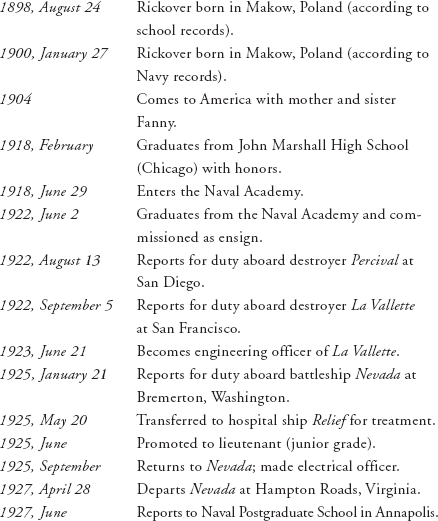
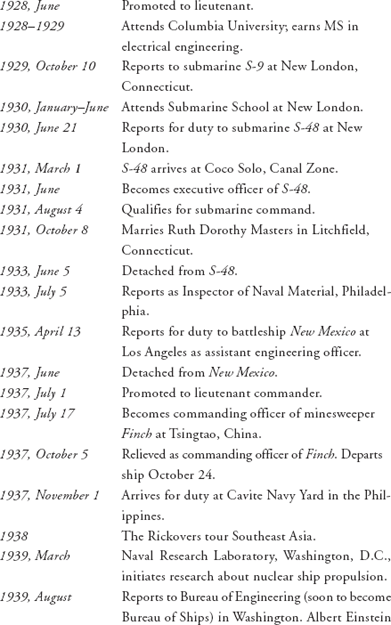
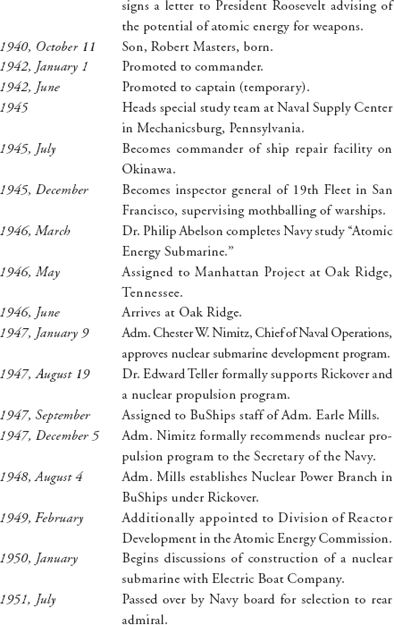
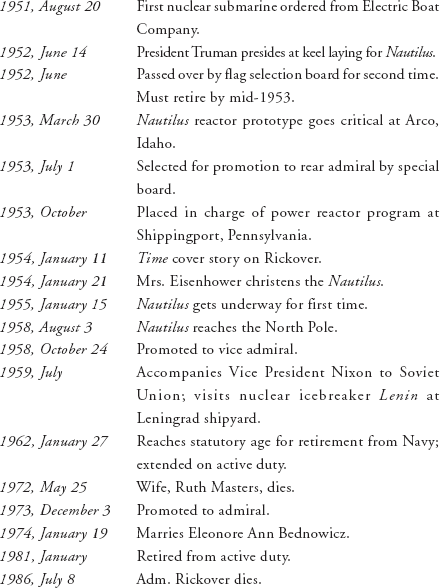
RICKOVER
1
Victory at Sea
World War IIthe most devastating and costly conflict in historycame to an end on September 2, 1945, when Japanese and Allied representatives signed the surrender accord on the deck of the U.S. battleship Missouri. At anchor in Tokyo Bay around the dreadnought were hundreds of U.S. warships, and when the brief ceremony was concluded, almost 1,000 U.S. carrierbased aircraft and 462 B29 Superfortress heavy bombers flew over the Missouri. The U.S. Navys aerial armada came from the massive carrier task force operating off the Japanese coast, which was kept at sea just in case the Japanese surrender was some kind of ghastly deception.


